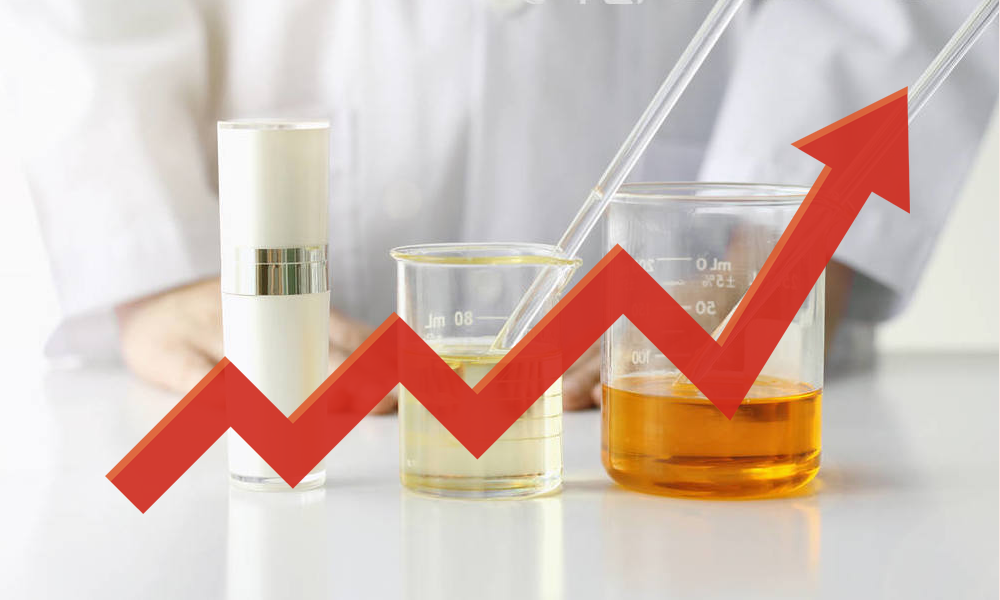
CBO reporter Li Siyang
As the Russo-Ukrainian war deepens its impact on the global beauty supply chain, European perfume and cosmetics manufacturers are facing shortages of paper, glass, and some essential oils and alcohol, and prices are being pushed up amid strong demand. At the same time, European beauty manufacturers, already affected by the epidemic, have been hit harder, especially small and medium-sized enterprises.
01
The Russo-Ukrainian war triggered an upstream supply crisis
The epidemic in China has made it difficult to purchase packaging parts
According to Reuters, the $500 billion global cosmetics industry is grappling with the effects of the war in Ukraine, as cosmetics producers make perfumes using alcohol made from organic grains and sugar beets, and using oil sunflowers to make cosmetics, which are also key crops in Ukrainian agriculture.
The energy crisis triggered by the war in Ukraine has also led to soaring glass and paper prices, while the lockdown in China has also made it difficult for European companies to purchase more affordable parts for perfume and lipstick packaging.
"Many beauty manufacturers are in a crisis management model on these supply issues." Emmanuel Guichard, general representative of the French cosmetics association FEBEA, said.
Federica Levato of Bain & Company said rising prices for packaging, energy and raw materials have led to a 25 to 30 percent increase in production costs for the cosmetics industry, a challenge for large cosmetics producers, although demand for personal care products remains strong.
According to the industry association Cosmetics Europe, European cosmetics manufacturers exported 22.6 billion euros (about 156.1 billion yuan) of beauty products in 2020. In the aftermath of the pandemic, they found a competitive demand for packaging materials. The pandemic has revitalized e-commerce, reducing plastic use while driving paper consumption.
Glassmakers have scaled back production in the early stages of the outbreak, shutting down the furnace in Italy for the first time in decades, and have struggled to cope with the demand for vaccine bottles. Before the Russo-Ukrainian War, the cost of long-necked fine-mouth bottles supplied by distributors was 0.75-1.40 euros, and now it is 1.00-1.50 euros.
Now, war-induced natural gas prices have exacerbated problems in both the paper and glass bottle industries, forcing Italian paper mills to temporarily halt production in order to renegotiate sales prices.
02
Energy costs have increased dramatically
Price shocks are gradually passed on to consumers
Italian glassmaker Bormioli Luigi expects the company to increase its energy costs by 80 million euros this year, half of which will be borne by its beauty department, whose customers include Chanel and Dior.
In fact, before the outbreak of the Russian-Ukrainian conflict, Europe's energy problems have been "deeply rooted", oil and gas are constrained by the supply side, and high dependence on energy to foreign countries has always been a huge "hidden danger" facing the whole of Europe. In addition to the high degree of external dependence on energy, the EU's own energy structure is also relatively unstable.
"Energy prices will remain high and will not return to normal anytime soon. The situation could get worse if the U.S. and Europe expand sanctions on Russia, where more than 40 percent of the EU's gas comes from. In a short period of time, Russian gas is difficult to replace. MARTIN BRUDMILLER, CEO of BASF, said.
With the armed conflict between Russia and Ukraine, the global financial war and resource war have gradually begun, with the Russian-Ukrainian conflict as the "tipping point", and Europe and Russia, the energy supply power, have gradually drifted apart. Russia is currently the most important energy exporter in Europe, the Conflict between Russia and Ukraine will undoubtedly push the energy supply problem in Europe to the cusp of the storm, in the case of Europe's high dependence on foreign energy and unstable energy structure, the shortage of energy and various commodities supply side has directly led to a sharp rise in the price of upstream products.
Last fall, European energy prices soared, leading many small businesses in Europe to bankruptcy and prompting others to temporarily cut production from unprofitable factories. Large industrial firms on the continent typically buy energy on a monthly basis, a strategy that often allows them to withstand price shocks and then gradually pass them on to consumers.
03
Packaging costs have doubled for multiple big names
The Chinese market may lead to another round of price increases
Francesco Pintucci, italy's chief executive of Isem Group, said the company doubled the cost of paper used to make rigid luxury boxes for customers such as Dolce & Gabbana, Ferragamo and Givenchy, causing prices for its products to rise by 10 to 40 percent.
Italian perfume maker ICR expects sales to exceed pre-COVID-19 levels this year, but Vice President Ambra Martone said the family-owned perfume maker, which makes Bulgari and Salvatore Ferragamo, is grappling with a 30 percent annual rise in alcohol costs, while glass and paper costs are up 10 percent.
While larger companies with higher profit margins have more money and flexibility to cope with price increases, such as L'Oréal's luxury division, which sells cosmetics and perfumes under the Giorgio Armani and Valentino brands, its operating margin is more than 20 percent. But for small and medium-sized companies in Europe, the challenge is particularly acute.
At the same time, these challenges are being exacerbated as consumers continue to snap up higher-priced beauty products, including perfumes made with higher concentrations of oil and more unusual ingredients.
Marco Vidal, managing director of Venice perfume maker Mavive and owner of the Venice Merchant brand, said, "From flavors and alcohol to glass and paper, we face shortages and price increases at every step, even including sprayer pumps and Surlyn plastic for bottle caps. ”
Some voices pointed out that the pressure of rising costs in the brand supply chain may shift to other countries, and China, as an important territory mentioned in the financial reports of major beauty groups, may prompt another round of price increases for big names in the Chinese market.